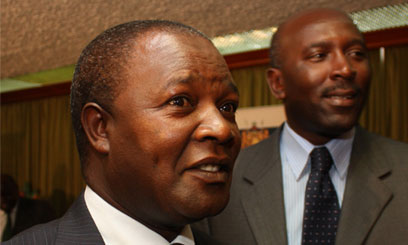
Finance Minister Robinson Githae told the House that he has written to the governor to inform him of the resolutions contained in a parliamentary report/FILE
NAIROBI, Kenya, Sep 6 – Barely a week after surviving reprimand in Parliament, Central Bank Governor Njuguna Ndung’u could find himself facing another censure Motion in the event MPs find he ignored recommendation of a parliamentary committee to reopen Charterhouse Bank that was closed seven years ago.
Finance Minister Robinson Githae told the House that he has written to the governor to inform him of the resolutions contained in a parliamentary report by the Finance and Trade Committee probing the closure of the bank in 2010.
He further said the committee led by Nambale MP Chris Okemo found out that the allegations of money-laundering and tax-evasion against the bank were unsustainable.
The minister said that the Attorney General had told him that he had no powers to order the Central Bank to reopen the bank because the Constitution guarantees the independence of the CBK.
Article 231(3) of the Constitution states that the Central Bank of Kenya shall not be under the direction or control of any person or authority in the exercise of its powers or in the performance of its functions.
“If I had the power, I’d have ordered and instructed the Central Bank to reopen the Charterhouse Bank, but I don’t have the power,” said Githae.
But MPs Charles Kilonzo and William Kabogo claimed the minister was running away from responsibility of his office, which had ordered the closure in 2006.
They accused the minister of feigning ignorance on the existence of the reports of the House yet he is a Member of Parliament.
This prompted Speaker Kenneth Marende to prod Githae on whether he was trying to pass the buck to the CBK.
“Minister, in the light of what you have said, can you then confirm to the House, that CBK is wrong in defying the Committee on Finance in Parliament?” posed Marende.
“I suggest that this House should give him some time for implementation and if he has not executed the matter then this House can take the necessary action. I believe this House is not powerless. You can censure any officer,” said Githae.
The matter can now be forwarded to the Implementation Committee which will look at the progress of execution and then make recommendations to the House and if adopted those found culpable will be censured.
The Finance Minister told MPs that he had submitted the details of the parliamentary resolution to have the bank reopened to the Central Bank, plus copies of the Hansard with details of the debate, to guide the governor in implementing the decision of the House.
“I have today written this letter to CBK and it was under personal delivery and I have evidence that the governor has received this letter of mine including the report of the committee. So he cannot claim ignorance,” he said.
Kilome MP Harun Mwau triggered the debate through a question and wondered why the Treasury had failed to reopen the bank even after the House approved a report calling for its reopening.
Two weeks ago, Deputy Speaker Farah Maalim directed Githae to report back to the House in a fortnight to give a definite decision on the bank’s fate.
MPs said the House committee on Finance, which investigated the circumstances on the closure of the bank had gone through all the records and listened to the evidence but found no reason why the bank stayed closed.
MPs Farah Maalim (Lagdera) and Isaac Ruto (Chepalungu) also raised the matter in supplementary question saying those who had banked with Charterhouse were suffering, because their deposits had been frozen with the closure of the bank.
Charterhouse Bank was established in 1996 and placed under statutory management in 2006 for allegedly violating the Banking Act.


































